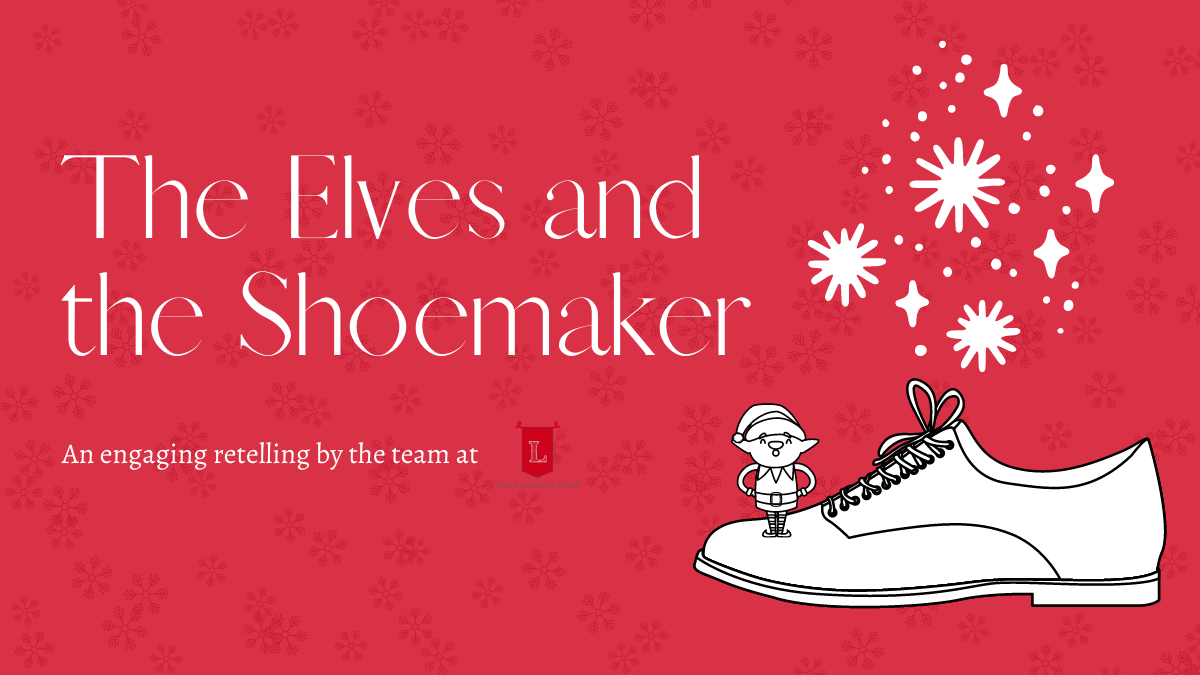The Elves and the Shoemaker is a fairy tale written by the Brothers Grimm in the early-1800s. It is one of the few overtly Christmas fairy tales that we have in western culture, and it involves many classic Christmas elements like gifts and elves.
Our version of the story has been simplified for young learners. However, if you are interested, you can see the original fairy tale of the Elves and the Shoemaker over at Americanliterature.com
If you want to use this story for more than just reading practice, take a look after the story for possible grammar lessons you could teach alongside this Christmas story. As well, we have more Christmas content for you, including:
Christmas Vocabulary
Best Christmas Songs for English Learners
A Christmas Carol (Story)
Rudolph the Red-Nosed Reindeer (Story)
The Elves and the Shoemaker PDF
For people who prefer a PDF, you can download one for free below. It is the same story with the same pictures as the version found on this page.
The Elves and the Shoemaker: Story
Please note that you can click on the hyperlinked words in our story to go to a dictionary where you can see definitions for these words.

In a small town lives an old man and an old woman.
They are both shoemakers.
They work very hard, but they are still poor.

One day, the old man finds that he has no more money.
He only has one more piece of leather, enough for one pair of shoes.

That night, he cuts out the shoes.
But he is too tired to finish.
So, he leaves the cut leather on his table and goes to bed.

In the morning, he comes downstairs to finish the shoes.
However, he finds that the shoes are already done!

The shoes are beautiful.
They are better than even the most expensive shoes.

That day, a man comes into the shop and buys the shoes for lots of money.
With that money, the old man buys enough leather to make two more shoes.

That night, he cuts out the leather for the two shoes and leaves them on the table.
He plans on finishing them the next morning.
But, the next morning, he finds them already done again!

The shoes are all beautiful.
They are better than even the first pair of shoes.

The old man continues to leave out leather every night.
And every morning, he finds new shoes already made for him.
Soon, the old man and his wife have enough money to live comfortably.

One night, the old man and his wife come up with a plan.
They want to see who is making the shoes for them.
So, they hide in the workshop and watch their worktable.

At midnight, two little elves appear and begin to make the shoes.
The elves laugh and joke while they work. Together, they make the most beautiful leather shoes.

The next day was Christmas Eve.
The old man and his wife decide to make gifts for the elves because they have helped them so much!
That night, they wrap their gifts and leave them on the table.
They hide in the room and watch for the elves again.

The elves find the gifts and open them.
They are so happy with their gifts!

From that day on, the old man and his wife leave gifts every night for the elves.
Everyone lived happily ever after.
Lessons with this Story
Here are some lesson ideas that you could teach using this story. There are always a ton of different lessons that you could spin out of a story, but here are the two that stood out the most to us.
Comparisons
Many children learning English struggle with comparisons. A lot of the problems stem from being unfamiliar with the sentence patterns that we use to compare two things. In this story, we see two examples of comparisons used.
They are better than even the first pair of shoes.
They are better than even the most expensive shoes.
Both of these examples use better than to compare shoes. It shows us how we can use the formula: A is/are (comparison) than B.
Starting with A is better than B can be a great place to begin making your child familiar with this kind of sentence pattern. From there, you can introduce other comparisons like faster than, stronger than, smarter than, etc.
Time Words
Time words are used in English to help us determine when something is happening. In our story, you can see time words or phrases like these:
One day
That night
In the morning
That day
The next morning
Every night
Every morning
One night
At midnight
From that day on
Most of these are very general time phrases that use the most basic time words (morning, day, night). Mastering these phrases not only helps you understand what is happening in the story, but also makes you a better storyteller.
More From The Learner’s Nook
It’s our goal to always have something new and exciting to see and learn on the Learner’s Nook. If you enjoyed our story today, then it may be a good idea to take a look at our other fairy tales in English. As well, you can sign up for our emails so that you will always know what new content is coming out and when.
